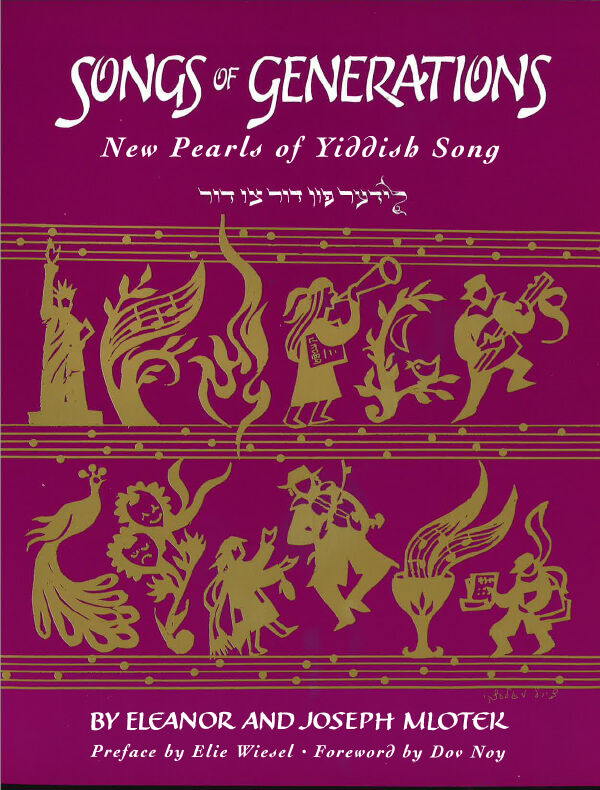Words by David Einhorn (1886-1973); composer unknown. Published by A. Bulkin and L. Efron in 1917 under the title “Alye lyule.” Composer Israel Gladstein, who wrote a different melody, has been credited erroneously with having composed this one. The song was sung by Khaytshe Lerman (née Banet) in the pre-World War II film Mir kumen on (We Are Coming) aboוt the children in the Medem Sanitarium in Miedzeszyn, Poland. The lullaby was repeated a few years ago on videotape produced in Melbourne, Australia, where it was sung by Khavele Gavenda, the granddaughter of the singer in the original film. A superimposed clip showing both grandmother and granddaughter singing the song is a touching moment in the videotape.

Lull-a-bye-ee, lull-a-bye-ee,
Sleep in peace, my dear one.
Happy is he who has a mother,
and a little cradle, too.
Lull-a, lull-a-bye.
Everything can still be found
money can still buy everything
but a mother is unique –
there is only one in the whole world.
Lull-a, lull-a-bye.
Sleep my dear, my beloved,
close your eyes and rest.
Happy is he who has a mother,
and a little cradle, too.
Lull-a, lull-a-bye.
It is, in fact, a gift from God,
for those who are so destined,
woe to the one who has no mother
in the wide and empty world…
Lull-a, lull-a-bye.
Lull-a-bye-ee, lull-a-bye-ee,
However great your sorrow,
it can always be rocked away
in your mother’s lap.
Lull-a, lull-a-bye.
Lull-a-bye-ee, lull-a-bye-ee,
However grave your sin,
it can always be washed away
by your mother’s pure teardrop.
Lull-a, lull-a-bye.
Ay-li, lyu-li, ay-li, lyu-li,
Shlof, mayn tayerer, in ru.
Voyl iz dem vos hot a mamen
Un a vigele dertsu,
Ay-li, lyu-lyu, lyu.
Altsding ken men nokh gefinen,
Altsding krigt men nokh far gelt.
Nor a mame zi iz eyne –
Mer nit eyne oyf der velt.
Ay-li, lyu-li-lyu.
Shlof, mayn tayerer, mayn liber,
Makh di oygn tsu un ru.
Gut iz dem vos hot a mamen
Un a vigele dertsu.
Ay-li, lyu-li-lyu.
Dos iz dokh a gots matone,
Vemen es iz nor bashert;
Vey iz dem vos hot keyn mamen
Oyf der groyser, vister erd. . .
Ay-li, lyu-li-lyu!
Ay-li, lyu-li, ay-li, lyu-li,
Vi der tsar zol zayn nit groys,
Tomed ken men im farvign
In der mames shoys.
Ay-li, lyu-li-lyu!
Ay-li, lyu-li, ay-li, lyu-li,
Vi di zind zol zayn nit shver,
Opvashn vet tomed kenen
Zi-der mames reyne trer.
Ay-li, lyu-li-lyu!
אֵײַ-לי, ליו-לי, אֵײַ-לי, ליו-לי,
שלאָף, מײַן טײַערער, אין רו.
װױל איז דעם װאָס האָט אַ מאַמען
און אַ װיגעלע דערצו.
אֵײַ-לי-ליו-ליו, ליו.
אַלצדינג קען מען נאָך געפֿינען,
אַלצדינג קריגט מען נאָך פֿאַר געלט.
נאָר א מאמע, זי איז אײנע –
מֶער ניט אײנע אױף דער װעלט.
אֵײַ-לי, ליו-לי-ליו.
שלאָף, מײַן טײַערער, מײַן ליבער,
מאַך די אױגן צו און רו.
גוט איז דעס װאָס האָט א מאַמען
און אַ װיגעלע דערצו.
אֵײַ-לי, ליו-לי-ליו.
דאָס איז דאָך אַ גאָטס מתּנה,
װעמען עס איז נאָר באַשערט;
װײ איז דעס, װאָס האָט קײן מאַמען
אױף דער גרױסער, װיסטער ערד. . .
אֵײ-לי, ליו-לי-ליו!
אַײ-לי, ליו-לי,אַײ-לי, ליו-לי,
װי דער צער זאָל זײַן ניט גרױס,
תּמיד קען מען אים פֿאַרװױגן
אין דער מאַמעס שוֹיס.
אֵײַ-לי, ליו-לי-ליו!
אֵײַ-לי, ליו-לי,אֵײַ-לי, ליו-לי,
װי די זינד זאָל זײַן ניט שװער,
אָפּװאַשן װעט תּמִיד קענען
זי – דער מאַמעס רײנע טרער.
אֵײַ-לי, ליו-לי-ליו!
Song Title: Nor A Mame

The Songs of Generations: New Pearls of Yiddish Song anthology comprises songs that were either never printed before or appeared in rare and inaccessible publications — sometimes in different versions and without proper sources. Most of the songs in this book were submitted by readers of Chana and Yosl’s column “Perl fun der yidisher poezye” (Pearls of Yiddish Poetry) in the Yiddish newspaper Der Forverts (The Forward), initiated in October, 1970. Over 25 years, thousands of songs were collected in correspondence and on cassettes from readers throughout the world, and they represent a veritable national Yiddish song archive. Chana Mlotek, in her introduction, writes, “In the course of years the inquiries, contributions and enthusiasm of these readers have kept our own interest unflagging and have reinforced our dedication to this effort. And in recent years our participants have also been augmented by new readers from the former Soviet Russia, who receive our newspaper there or from newly-arrived immigrants in this country and Israel.”